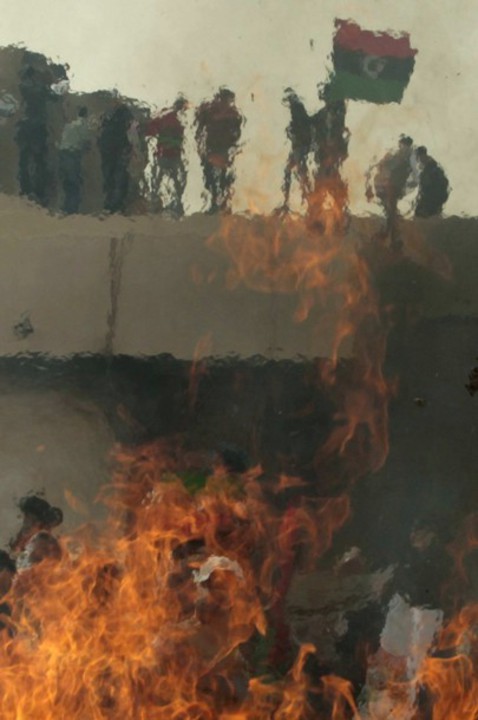Conferences and debates
Index / Activities / Conferences and debates / Prospects for peace and mediation in Libya
Prospects for peace and mediation in Libya
September 27, 20177:00 p.m.
MADRID
Casa Árabe Auditorium (at Calle Alcalá, 62)
7:00 p.m.
Free entry until the event’s capacity is reached.
In English and Spanish, with simultaneous translation.
Mohamed Eljarh and José Vericat are giving this conference organized by
Casa Árabe and the Center for Strategic Action (Stractegia).
Along with Eljarh, a non-resident fellow with the Atlantic Council, and Vericat, an advisor for the Middle East program of the International Peace Institute, the event will be attended by Barah Mikaïl, the director of Stractegia and an associate professor at Saint Louis University, who will be moderating the session.
Since December 2015, when the Skhirat Agreement was signed in Morocco, the factions in the Libyan conflict were expected to put an end to their differences in order to form a national unity government. Two years have gone by, and neither Prime Minister Fayaz al-Sirraj nor the military leader Khalifa Haftar have managed to unite their two sides. At a meeting in Paris with French president Emmanuel Macron last July, they announced a ceasefire and new elections. However, as of today, the reasons behind their disagreement continue to hinder the potential for any approach between the two leaders and their respective sides. In the meantime, the summits on both sides of the Mediterranean have increased in number, and the special UN envoy for Libya, Ghassan Salamé, has pointed out that “there are six or seven different operations in front of Libyans’ eyes. Too many cooks spoil the broth.” Within this context, what are the prospects for peace and mediation in Libya?
Mohamed Eljarh is a non-resident fellow with the Atlantic Council and an associate expert with the Sahel-Maghreb Research Platform organized by the Danish Institute of International Studies in Copenhagen. He briefly worked as a political consultant for the EU’s Libya Mission in Brussels in 2015, and from 2014 through 2016, Eljarh worked as a consultant for the United Kingdom’s Special Envoy to Libya, Jonathan Powell, advising him on political affairs and security. He has worked extensively with Foreign Policy, The New York Times and CNN.com and he is a frequent commentator in international media such as CNN, BBC, Al-Jazeera, Sky News and al-Arabiya, as well as others.
José Vericat is an advisor with the Middle East program of the International Peace Institute (IPI) in New York. Before joining the IPI, he worked as an EU spokesman in the Middle East and a correspondent for the Spanish news agency EFE. His coverage of the second intifada and war in Iraq was awarded by the International Press Club. He has a PhD in Far Eastern Studies at Oxford University and a Master’s degree from the International and Public Business School at Columbia University. At Oxford University, he was granted the Sheikh Zayed fellowship in Contemporary Islamic Studies and taught courses on Middle East politics, political Islam and the UN’s role in the Middle East. Along with Francesco Mancini, he co-authored the report “Lost in Transition: UN Mediation in Libya, Syria, and Yemen” (New York: International Peace Institute, November 2016).
Since December 2015, when the Skhirat Agreement was signed in Morocco, the factions in the Libyan conflict were expected to put an end to their differences in order to form a national unity government. Two years have gone by, and neither Prime Minister Fayaz al-Sirraj nor the military leader Khalifa Haftar have managed to unite their two sides. At a meeting in Paris with French president Emmanuel Macron last July, they announced a ceasefire and new elections. However, as of today, the reasons behind their disagreement continue to hinder the potential for any approach between the two leaders and their respective sides. In the meantime, the summits on both sides of the Mediterranean have increased in number, and the special UN envoy for Libya, Ghassan Salamé, has pointed out that “there are six or seven different operations in front of Libyans’ eyes. Too many cooks spoil the broth.” Within this context, what are the prospects for peace and mediation in Libya?
Mohamed Eljarh is a non-resident fellow with the Atlantic Council and an associate expert with the Sahel-Maghreb Research Platform organized by the Danish Institute of International Studies in Copenhagen. He briefly worked as a political consultant for the EU’s Libya Mission in Brussels in 2015, and from 2014 through 2016, Eljarh worked as a consultant for the United Kingdom’s Special Envoy to Libya, Jonathan Powell, advising him on political affairs and security. He has worked extensively with Foreign Policy, The New York Times and CNN.com and he is a frequent commentator in international media such as CNN, BBC, Al-Jazeera, Sky News and al-Arabiya, as well as others.
José Vericat is an advisor with the Middle East program of the International Peace Institute (IPI) in New York. Before joining the IPI, he worked as an EU spokesman in the Middle East and a correspondent for the Spanish news agency EFE. His coverage of the second intifada and war in Iraq was awarded by the International Press Club. He has a PhD in Far Eastern Studies at Oxford University and a Master’s degree from the International and Public Business School at Columbia University. At Oxford University, he was granted the Sheikh Zayed fellowship in Contemporary Islamic Studies and taught courses on Middle East politics, political Islam and the UN’s role in the Middle East. Along with Francesco Mancini, he co-authored the report “Lost in Transition: UN Mediation in Libya, Syria, and Yemen” (New York: International Peace Institute, November 2016).

